Blog - Foot Doctor, Chambersburg and McConnellsburg, PA
Broken Foot Symptoms
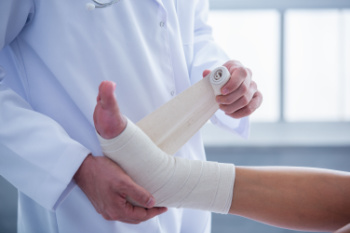
A broken foot, or foot fracture, occurs when one or more bones in the foot crack or break, often due to trauma such as a fall, sports injury, or accident. In addition to severe pain, symptoms of a broken foot typically include significant swelling and bruising around the injured area. You may have difficulty bearing weight on the foot and notice an abnormal shape or deformity. Tenderness in the affected area is common, and there may be a limited range of motion in the foot or toes. Numbness or tingling sensations can also occur, which may indicate nerve involvement. Difficulty walking or bearing weight on the foot, even when attempting to limp, is another sign. If you experience these symptoms, seeking medical evaluation is key to assessing the extent of the injury and determining appropriate care. If you suspect you have a broken foot or need guidance on treatment and rehabilitation, it’s suggested that you make an appointment with a podiatrist for specialized care to ensure the best possible outcome for your injury.
A broken foot requires immediate medical attention and treatment. If you need your feet checked, contact Dr. Steven Schwartz from Pennsylvania. Our doctor can provide the care you need to keep you pain-free and on your feet.
Broken Foot Causes, Symptoms, and Treatment
A broken foot is caused by one of the bones in the foot typically breaking when bended, crushed, or stretched beyond its natural capabilities. Usually the location of the fracture indicates how the break occurred, whether it was through an object, fall, or any other type of injury.
Common Symptoms of Broken Feet:
- Bruising
- Pain
- Redness
- Swelling
- Blue in color
- Numbness
- Cold
- Misshapen
- Cuts
- Deformities
Those that suspect they have a broken foot shoot seek urgent medical attention where a medical professional could diagnose the severity.
Treatment for broken bones varies depending on the cause, severity and location. Some will require the use of splints, casts or crutches while others could even involve surgery to repair the broken bones. Personal care includes the use of ice and keeping the foot stabilized and elevated.
If you have any questions please feel free to contact our offices located in Chambersburg, and Mcconnellsburg, PA . We offer the newest diagnostic and treatment technologies for all your foot and ankle needs.
Common Foot and Ankle Injuries in Golf

Golf, though less intense than other sports, can still lead to foot and ankle injuries due to repetitive motions and uneven terrain. Common foot issues among golfers include ankle sprains from uneven surfaces or sudden movements during swings. Plantar fasciitis may develop from prolonged standing and walking, causing heel pain. Stress fractures can occur from overuse and excessive impact on the feet. To prevent these injuries, golfers should wear supportive, well-fitted golf shoes that offer good traction and cushioning. Proper warm-up and stretching exercises, focusing on the feet and ankles, can help prepare the body for the game. Additionally, paying attention to the course's condition and avoiding rough or uneven areas can minimize injury risk. Regular foot strengthening and flexibility exercises can also enhance resilience and prevent common golf-related foot and ankle problems. If you have endured a foot or ankle injury while playing golf, it is suggested that you contact a podiatrist who can treat various foot conditions and educate you on proper injury prevention techniques while playing golf.
Ankle and foot injuries are common among athletes and in many sports. They can be caused by several problems and may be potentially serious. If you are feeling pain or think you were injured in a sporting event or when exercising, consult with Dr. Steven Schwartz from Pennsylvania. Our doctor will assess your condition and provide you with quality foot and ankle treatment.
Common Injuries
The most common injuries that occur in sporting activities include:
- Achilles Tendonitis
- Achilles Tendon Rupture
- Ankle Sprains
- Broken Foot
- Plantar Fasciitis
- Stress Fractures
- Turf Toe
Symptoms
Symptoms vary depending upon the injury and in some cases, there may be no symptoms at all. However, in most cases, some form of symptom is experienced. Pain, aching, burning, bruising, tenderness, tightness or stiffness, sensation loss, difficulty moving, and swelling are the most common symptoms.
Treatment
Just as symptoms vary depending upon the injury, so do treatment options. A common treatment method is known as the RICE method. This method involves rest, applying ice, compression and elevating the afflicted foot or ankle. If the injury appears to be more serious, surgery might be required, such as arthroscopic or reconstructive surgery. Lastly, rehabilitation or therapy might be needed to gain full functionality in the afflicted area. Any discomfort experienced by an athlete must be evaluated by a licensed, reputable medical professional.
If you have any questions, please feel free to contact our offices located in Chambersburg, and Mcconnellsburg, PA . We offer the newest diagnostic and treatment technologies for all your foot care needs.
Diagnosing Heel Pain
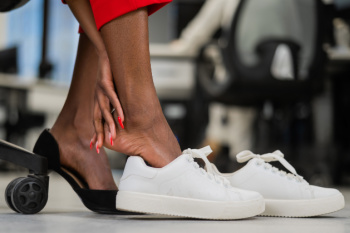
The heel, the largest bone in the foot, plays an important role in walking and weight-bearing, absorbing shock and providing stability. Heel pain is a common issue with various causes. Plantar fasciitis, characterized by inflammation of the plantar fascia, leads to sharp, morning heel pain. Heel spurs, which are calcium deposits on the heel bone, can cause discomfort with prolonged standing or walking. Sever's disease, prevalent in growing children, results from inflammation of the heel growth plate. These conditions necessitate professional assessment. If you or a family member suffers from heel pain, it is suggested that you consult a podiatrist for a proper diagnosis, identify the underlying cause, and recommend appropriate treatments.
Many people suffer from bouts of heel pain. For more information, contact Dr. Steven Schwartz of Pennsylvania. Our doctor can provide the care you need to keep you pain-free and on your feet.
Causes of Heel Pain
Heel pain is often associated with plantar fasciitis. The plantar fascia is a band of tissues that extends along the bottom of the foot. A rip or tear in this ligament can cause inflammation of the tissue.
Achilles tendonitis is another cause of heel pain. Inflammation of the Achilles tendon will cause pain from fractures and muscle tearing. Lack of flexibility is also another symptom.
Heel spurs are another cause of pain. When the tissues of the plantar fascia undergo a great deal of stress, it can lead to ligament separation from the heel bone, causing heel spurs.
Why Might Heel Pain Occur?
- Wearing ill-fitting shoes
- Wearing non-supportive shoes
- Weight change
- Excessive running
Treatments
Heel pain should be treated as soon as possible for immediate results. Keeping your feet in a stress-free environment will help. If you suffer from Achilles tendonitis or plantar fasciitis, applying ice will reduce the swelling. Stretching before an exercise like running will help the muscles. Using all these tips will help make heel pain a condition of the past.
If you have any questions please contact our offices located in Chambersburg, and Mcconnellsburg, PA . We offer the newest diagnostic and treatment technologies for all your foot and ankle needs.
Choosing the Best Shoes for a Foot Stress Fracture
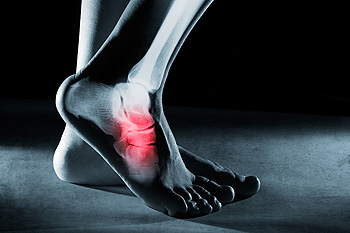
Selecting the right footwear is essential for healing a foot stress fracture and preventing further injury. Opt for shoes that provide ample cushioning and support to reduce impact and distribute weight evenly across the foot. Look for options with a rigid midsole that offers stability and minimizes excessive movement, which can aggravate the fracture. Avoid high heels and shoes with a narrow toe box, as these can place additional stress on the foot and hinder recovery. Additionally, shoes with adjustable closures or custom orthotics can help accommodate swelling and offer a better fit. Prioritizing comfort and support over style is important during the healing process to ensure proper recovery and prevent future complications. If you have endured a foot stress fracture, it is suggested that you consult a podiatrist who can offer you correct relief and treatment methods, which can include what type of shoes to wear for optimal healing.
Stress fractures occur when there is a tiny crack within a bone. To learn more, contact Dr. Steven Schwartz from Pennsylvania. Our doctor can provide the care you need to keep you pain free and on your feet.
How Are They Caused?
Stress fractures are the result of repetitive force being placed on the bone. Since the lower leg and feet often carry most of the body’s weight, stress fractures are likely to occur in these areas. If you rush into a new exercise, you are more likely to develop a stress fracture since you are starting too much, too soon. Pain resulting from stress fractures may go unnoticed at first, however it may start to worsen over time.
Risk Factors
- Gender – They are more commonly found in women compared to men.
- Foot Problems – People with unusual arches in their feet are more likely to develop stress fractures.
- Certain Sports – Dancers, gymnasts, tennis players, runners, and basketball players are more likely to develop stress fractures.
- Lack of Nutrients – A lack of vitamin D and calcium may weaken the bones and make you more prone to stress fractures
- Weak Bones – Osteoporosis can weaken the bones therefore resulting in stress fractures
Stress fractures do not always heal properly, so it is important that you seek help from a podiatrist if you suspect you may have one. Ignoring your stress fracture may cause it to worsen, and you may develop chronic pain as well as additional fractures.
If you have any questions, please feel free to contact our offices located in Chambersburg, and Mcconnellsburg, PA . We offer the newest diagnostic and treatment technologies for all your foot care needs.
Turf Toe Injuries Common in Athletes

Turf toe, or a metatarsophalangeal, MTP, joint sprain, is a common injury affecting athletes, particularly those playing on artificial turf. This injury occurs when the big toe is hyperextended as the heel lifts off the ground, causing the soft tissues and ligaments in the MTP joint to stretch or tear. Athletes who make sudden movements or push off their toes into sprints are especially vulnerable. Turf toe can vary in severity, from mild where tissues are stretched, to severe where tissues are completely torn and the joint may be dislocated. Symptoms can include pain, swelling, bruising, limited range of motion, and sometimes a loose or unstable joint. A podiatrist can diagnose and treat turf toe effectively through imaging tests, like X-rays or MRI scans, and create a treatment plan. This includes medication, custom orthotics, or in rare cases, surgery. Timely consultation with a podiatrist ensures proper healing and helps athletes return to their sport. If you are experiencing pain in the big toe joint, it is suggested that you schedule an appointment with a podiatrist for an exam, diagnosis, and treatment options.
Toe pain can disrupt your daily activities. If you have any concerns, contact Dr. Steven Schwartz of Pennsylvania. Our doctor can provide the care you need to keep you pain-free and on your feet.
What Causes Toe Pain?
Most severe toe pain is caused due to a sports injury, trauma from dropping something heavy on the toe, or bumping into something rigid. Other problems can develop over time for various reasons.
Toe pain can be caused by one or more ailments. The most common include:
- Trauma
- Sports injury
- Wearing shoes that are too tight
- Arthritis
- Gout
- Corns and calluses
- Hammertoe
- Bunions
- Blisters
- Ingrown toenails
- Sprains
- Fractures (broken bones)
- Dislocations
When to See a Podiatrist
- Severe pain
- Persistent pain that lasts more than a week
- Signs of infection
- Continued swelling
- Pain that prevents walking
Diagnosis
In many cases the cause of toe pain is obvious, but in others, a podiatrist may want to use more advanced methods to determine the problem. These can range from simple visual inspections and sensation tests to X-rays and MRI scans. Prior medical history, family medical history, and any recent physical traumatic events will all be taken into consideration for a proper diagnosis.
Treatment
Treatments for toe pain and injuries vary and may include shoe inserts, padding, taping, medicines, injections, and in some cases, surgery. If you believe that you have broken a toe, please see a podiatrist as soon as possible.
If you have any questions please feel free to contact our offices located in Chambersburg, and Mcconnellsburg, PA . We offer the newest diagnostic tools and technology to treat your foot and ankle needs.
Total Contact Casting for Diabetic Foot Ulcers
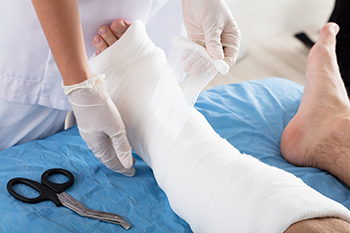
Total contact casting, or TCC, is a specialized technique used by podiatrists to treat diabetic foot ulcers by alleviating pressure on areas susceptible to skin breakdown. This method involves the application of a fiberglass or plaster cast molded to the foot's contours, which allows for even distribution of weight across the entire foot, rather than concentrating it on vulnerable spots. Total contact casting helps protect the ulcer and fosters a healing environment while allowing patients to remain mobile. It is primarily used for diabetic foot ulcers and Charcot foot, with careful monitoring required due to the potential for reduced sensation in diabetic patient's feet. Proper application includes cushioning, protective padding, and ensuring the cast is kept dry to prevent complications. The cast is typically replaced weekly until the ulcer heals sufficiently for normal footwear or orthotics. Consulting a podiatrist ensures appropriate application and monitoring of a total contact cast, preventing further complications. If you have developed diabetic foot ulcers, it is suggested that you schedule an appointment with a podiatrist to see if total contact casting is right for you.
Diabetic foot care is important in preventing foot ailments such as ulcers. If you are suffering from diabetes or have any other concerns about your feet, contact Dr. Steven Schwartz from Pennsylvania. Our doctor can provide the care you need to keep you pain-free and on your feet.
Diabetic Foot Care
Diabetes affects millions of people every year. The condition can damage blood vessels in many parts of the body, especially the feet. Because of this, taking care of your feet is essential if you have diabetes, and having a podiatrist help monitor your foot health is highly recommended.
The Importance of Caring for Your Feet
- Routinely inspect your feet for bruises or sores.
- Wear socks that fit your feet comfortably.
- Wear comfortable shoes that provide adequate support.
Patients with diabetes should have their doctor monitor their blood levels, as blood sugar levels play such a huge role in diabetic care. Monitoring these levels on a regular basis is highly advised.
It is always best to inform your healthcare professional of any concerns you may have regarding your feet, especially for diabetic patients. Early treatment and routine foot examinations are keys to maintaining proper health, especially because severe complications can arise if proper treatment is not applied.
If you have any questions please feel free to contact our offices located in Chambersburg, and Mcconnellsburg, PA . We offer the newest diagnostic and treatment technologies for all your foot and ankle needs.
Causes and Treatment of Metatarsalgia
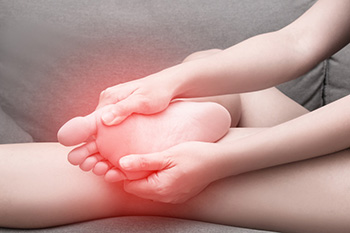 Metatarsalgia, a painful inflammation in the ball of the foot, commonly stems from overuse injuries in sports that involve running and jumping. Wearing poorly fitting shoes, foot abnormalities like high arches or bunions, and conditions such as arthritis can also contribute to this condition. Pain in the ball of the foot typically develops gradually and may worsen with activities like standing, walking, or high-impact sports. Symptoms can include a sensation of walking on a pebble, sharp burning pain, and numbness or tingling in the toes. Treatment by a podiatrist focuses on addressing the underlying cause and relieving pain. Conservative measures include resting the foot and taking pain relievers. Changing to well-fitting shoes with good support and using orthotic pads can also help to alleviate discomfort. Weight loss, if applicable, can reduce pressure on the metatarsal area. In more persistent cases, custom orthotics may be recommended to improve gait and foot mechanics. Surgery is considered to be a last resort if conservative treatments fail. If you are experiencing pain in the ball of the foot, it is suggested that you schedule an appointment with a podiatrist for an exam, diagnosis, and treatment options.
Metatarsalgia, a painful inflammation in the ball of the foot, commonly stems from overuse injuries in sports that involve running and jumping. Wearing poorly fitting shoes, foot abnormalities like high arches or bunions, and conditions such as arthritis can also contribute to this condition. Pain in the ball of the foot typically develops gradually and may worsen with activities like standing, walking, or high-impact sports. Symptoms can include a sensation of walking on a pebble, sharp burning pain, and numbness or tingling in the toes. Treatment by a podiatrist focuses on addressing the underlying cause and relieving pain. Conservative measures include resting the foot and taking pain relievers. Changing to well-fitting shoes with good support and using orthotic pads can also help to alleviate discomfort. Weight loss, if applicable, can reduce pressure on the metatarsal area. In more persistent cases, custom orthotics may be recommended to improve gait and foot mechanics. Surgery is considered to be a last resort if conservative treatments fail. If you are experiencing pain in the ball of the foot, it is suggested that you schedule an appointment with a podiatrist for an exam, diagnosis, and treatment options.
Foot Pain
Foot pain can be extremely painful and debilitating. If you have a foot pain, consult with Dr. Steven Schwartz from Pennsylvania. Our doctor will assess your condition and provide you with quality foot and ankle treatment.
Causes
Foot pain is a very broad condition that could be caused by one or more ailments. The most common include:
- Bunions
- Hammertoes
- Plantar Fasciitis
- Bone Spurs
- Corns
- Tarsal Tunnel Syndrome
- Ingrown Toenails
- Arthritis (such as Gout, Rheumatoid, and Osteoarthritis)
- Flat Feet
- Injury (from stress fractures, broken toe, foot, ankle, Achilles tendon ruptures, and sprains)
- And more
Diagnosis
To figure out the cause of foot pain, podiatrists utilize several different methods. This can range from simple visual inspections and sensation tests to X-rays and MRI scans. Prior medical history, family medical history, and any recent physical traumatic events will all be taken into consideration for a proper diagnosis.
Treatment
Treatment depends upon the cause of the foot pain. Whether it is resting, staying off the foot, or having surgery; podiatrists have a number of treatment options available for foot pain.
If you have any questions, please feel free to contact our offices located in Chambersburg, and Mcconnellsburg, PA . We offer the newest diagnostic and treatment technologies for all your foot care needs.
Soothing Stretches for Relieving Tired Feet
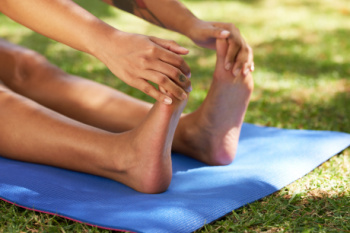
After a long day of standing or walking, tired feet are a common discomfort. Incorporating foot stretches into your routine can provide much-needed relief and rejuvenation. One effective stretch is the toe stretch, where you sit with your legs extended and use your hands to gently pull your toes back toward your body, feeling a stretch along the bottom of your feet. Another helpful stretch is the calf stretch, which involves standing facing a wall with one foot forward and the other foot back, bending the front knee while keeping the back leg straight, and pressing the heel into the ground to feel a stretch in the calf muscle. Additionally, the plantar fascia stretch targets the arch of the foot by sitting with one leg crossed over the other and gently pulling back on the toes of the crossed leg. These simple yet effective stretches can alleviate tension and soreness, leaving your feet feeling refreshed and revitalized. If your feet are tired during the day, it is suggested that you consult a podiatrist who can provide a comprehensive examination and offer you additional specific stretches to perform.
Why Stretching Is Important for Your Feet
Stretching the feet is a great way to prevent injuries. If you have any concerns with your feet consult with Dr. Steven Schwartz from Pennsylvania. Our doctor will assess your condition and provide you with quality foot and ankle treatment.
Stretching the Feet
Stretching the muscles in the foot is an important part in any physical activity. Feet that are tight can lead to less flexibility and make you more prone to injury. One of the most common forms of foot pain, plantar fasciitis, can be stretched out to help ease the pain. Stretching can not only ease pain from plantar fasciitis but also prevent it as well. However, it is important to see a podiatrist first to determine if stretching is right for you. Podiatrists can also recommend other ways to stretch your feet. Once you know whether stretching is right for you, here are some excellent stretches you can do.
- Using a foam roller or any cylindrical object (a water bottle or soda can will do), roll the object under your foot back and forth. You should also exert pressure on the object. Be sure to do this to both feet for a minute. Do this exercise three times each.
- Similar to the previous exercise, take a ball, such as a tennis ball, and roll it under your foot while seated and exert pressure on it.
- Grab a resistance band or towel and take a seat. If you are using a towel, fold it length wise. Next put either one between the ball of your foot and heel and pull with both hands on each side towards you. Hold this for 15 seconds and then switch feet. Do this three times for each foot.
- Finally hold your big toe while crossing one leg over the other. Pull the toe towards you and hold for 15 seconds. Once again do this three times per foot.
It is best to go easy when first stretching your foot and work your way up. If your foot starts hurting, stop exercising to ice and rest the foot. It is advised that you then see a podiatrist for help.
If you have any questions, please feel free to contact our offices located in Chambersburg, and Mcconnellsburg, PA . We offer the newest diagnostic and treatment technologies for all your foot care needs.



